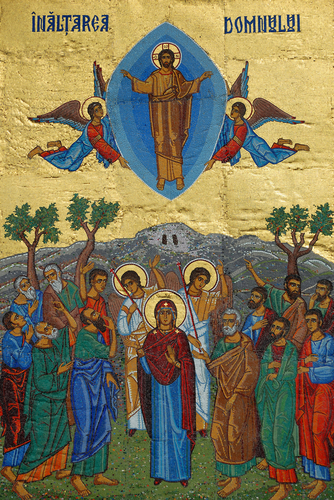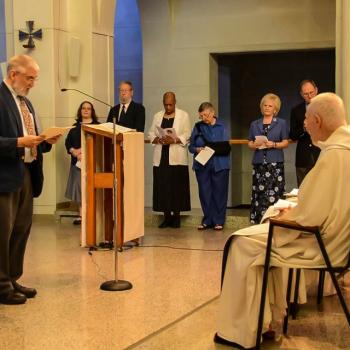
In the first chapter of The Acts of the Apostles, Jesus gives his disciples their last instructions before his ascension into heaven (Acts 1:6-12).
The first chapter of Acts is one of the easiest chapters in the New Testament to gloss over. After all, the real action of Acts begins with the second chapter, which recounts the coming of the Holy Spirit at Pentecost.
If the Gospels tell the story of the life, ministry, death and resurrection of Jesus, then the Acts of the Apostles by contrast tells the story of the Holy Spirit and of the first dramatic years of the Church.
Jesus seems to have little more than a couple of cameo appearances, in chapter 1 and then during St. Paul’s mystical conversion on the Road to Damascus.
So given the overall story line of Acts, it’s all too easy to overlook the moment when Jesus gave his disciples what would be his final instructions. Just before the ascension, “he ordered them not to leave Jerusalem, but to wait there for the promise of the Father. ‘This’, he said, ‘is what you have heard from me; for John baptized with water, but you will be baptized with the Holy Spirit not many days from now.’” (Acts 1:4-5)
Wait for the promise of the father.
It’s all too easy — I’ve done it countless times — to focus on the Holy Spirit in this trinitarian quotation. Jesus seems to be saying, “In just a few days you’ll be baptized in the Holy Spirit.” But he doesn’t say “in just a few days” — all he says is wait. His final instructions — indeed, his final order, is open-ended: just to wait for the promise of the father.
Dare we speculate that at the end of his ministry, Jesus is telling his disciples to be contemplative?
I think it’s a reasonable interpretation. Contemplation, after all, is the prayer of waiting. Dumiyyah, the most evocatively contemplative word in the Hebrew language, means not only silence but waiting (see Psalm 62:1). And while Acts 1 does not record Jesus giving the disciples instructions about silence, or sitting in silence, or following your breath, anything like that, I think that just is evidence that Jesus was not one to bother with techniques or methods.
For Jesus, being a contemplative was not about a practice of meditating 20 minutes twice a day (although I don’t think Jesus would object to such a discipline). Rather, contemplation meant waiting for God. And waiting happens best in a spirit of silent expectancy.
Wait for the promise of the father: for the Spirit who gives life. Not only was this the last word from Jesus to his direct followers on that day in Israel so long ago, but it also speaks to us today. When we observe silence, we are not just “emptying our mind” — we wait. For God.
What do you do, to ensure that you have time in your life for silence every day? If you have any thoughts to share on this topic, please leave a comment here, or on social media.
N.B. Special thanks to the Rev. Nancy Baxter, SSAP, whose sermon on Acts 1:15-26 at St. Bartholomew’s Episcopal Church in Atlanta, GA on May 17, 2015, inspired this blog post.
Enjoy reading this blog?
Click here to become a patron.














